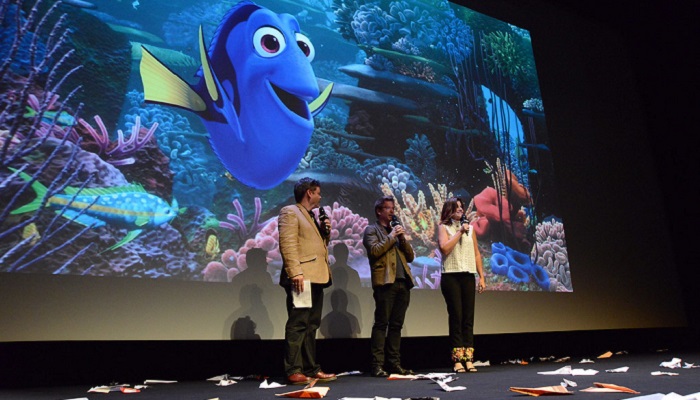
WARNING: This article may contain spoilers.
It’s been 13 years since we’ve been introduced to that quirky and forgetful blue tang fish named Dory in Finding Nemo.
Finding Dory really touches those who suffer from mental illness in the way that it portrays a leading character that suffers from a mental illness, overcomes obstacles, and defies the odds to achieve victory. It captures Dory’s struggles and draws parallels to what day-to-day life is actually like for those who suffer from depression, anxiety, and countless other mental illnesses. She is a beacon for all the people who are lost trying to cope with their symptoms.
Dory creates a positive role model for the mental health community as she starts the movie off having learned to cope with her disability and lives day-to-day as best as she can. She is a powerful symbol for the mental health community, as the movie captures what an uphill struggle mental illness can be, and shows us who suffer that it’s possible to overcome challenges that we may believe are impossible.
Here are 5 ways that Finding Dory perfectly delivered messages that the mental health community wants you to know:
1. How much easier it is to cope with our illnesses when we have a good support system
In the very beginning of the movie, Dory swims around aimlessly looking for her family and struggling to remember. Dory found support with Marlin and Nemo, and Mr. Ray’s class as well. The beginning of the movie shows Marlin watching over Dory as she sleeps to make sure she doesn’t sleep swim away. Later, Mr. Ray is shown making accommodations for Dory to tag along with his class because it makes her feel important. Knowing we have someone to help us along with our toughest days makes all the difference in the world.
2. We will often feel like a burden
In a scene where Dory endangers Nemo, Marlin becomes frustrated with her and tells her to “go swim over there and forget, it’s what you do best.” Dory immediately feels like she has been a burden to Marlin and Nemo and decides that she doesn’t want to feel that way anymore and wanders off on her own, endangering herself. We don’t like to feel we’re bothering you, but we will, especially in situations like this. We understand it can be frustrating at times to support someone with mental illness, because it’s really hard living with the mental illness, and sometimes the smallest show of frustration will drive us to believe we’re nothing but a burden.
3. Our illnesses may cause us to sometimes lack the tools we need to make good decisions
In one scene, Dory is careless swimming through a shipwreck yelling for her parents despite many of the local crustaceans telling her to be quiet. She has no regard for the consequences of her actions because she believes that if she doesn’t keep doing what she’s doing, she’ll forget and her progress will be lost. For example, for those who suffer from depression and anxiety, we sometimes make rash decisions in an attempt to make a certain feeling go away. We may hastily make decisions that we shouldn’t in a hasty attempt to stop feeling anxious or to remove ourselves from situations that make us feel that way.
4. The “impossible” is possible with the right support and resources
When you live with a mental illness, simply waking up in the morning can seem like an uphill battle that’s impossible to win. Having the right people by your side can make it a hell of a lot easier. It’s knowing when to ask for help and having the courage to do so is what can get tricky. Dory knows that she can’t cross the ocean alone, so she reaches out to Marlin and Nemo. Her use of resources and intuition is ultimately what gets her to her end goal. Once inside the aquarium, she enlists in Hank the “Septopus” for his help in getting her to the open ocean exhibit, as well as those she meets along the way.
5. Someone will always love you unconditionally
Dory’s parents demonstrated unconditional love for their daughter by focusing on her strengths instead of her weaknesses. Though they were worried for her and found her frustrating at times, they never let that show in front of Dory. Even after years apart (years? How long does a blue tang live?? What’s the time scale here?), they never gave up on Dory, and still played to her strengths by laying out paths of shells every day in hopes that she would find her way home. The people who don’t give up on us, no matter how frustrating our illnesses may be for them are the ones who matter the most and will never leave our side.
Finding Dory was a great way to reach families and children who may deal with issues such as mental illness. It creates a good topic of conversation in a way that it isn’t glaringly obvious and upsetting. It’s touching and fresh and funny, and paves the way for learning more about various mental illnesses. I found that it captured the mental struggle well, even though Dory and I suffer from very different mental illnesses. After all, we’re all in this together.
Featured image via “Séance événement ; Le Monde de Dory / Finding Dory Disney Art Challenge ; Angus MACLANE, Andrew STANTON ; Alan BARILLARO” by Festival international du film d’animation-Annecy / CC BY-NC-ND 2.0